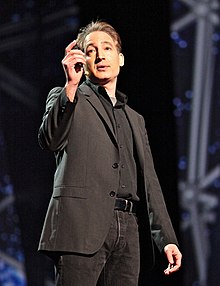
Back براين غرين Arabic براين جرين ARZ Brayan Qrin Azerbaijani برایان قرین AZB Брайън Грийн Bulgarian Brian Greene Catalan برایان گرین CKB Brian Greene Czech Brian Greene Danish Brian Greene German
Brian Greene | |
|---|---|
 Greene in 2012 | |
| Born | Brian Randolph Greene February 9, 1963 New York City, U.S. |
| Alma mater | Harvard University (BS) Magdalen College, Oxford (PhD) |
| Known for | String theory The Elegant Universe The Fabric of the Cosmos The Hidden Reality |
| Spouse | Tracy Day |
| Children | 2 |
| Awards | Andrew Gemant Award (2003) |
| Scientific career | |
| Fields | Physics |
| Institutions | Cornell University Columbia University |
| Thesis | Superstrings: topology, geometry and phenomenology and astrophysical implications of supersymmetric models (1986) |
| Doctoral advisor | Graham G. Ross James Binney |
Brian Randolph Greene[1] (born February 9, 1963) is an American physicist known for his research on string theory. He is a professor of physics and mathematics at Columbia University, director of its center for theoretical physics, and the chairman of the World Science Festival, which he co-founded in 2008. Greene co-discovered mirror symmetry, relating two different Calabi–Yau manifolds.[2] He also described the flop transition, a mild form of topology change, and the conifold transition, a more severe transformation of space, showing that topology can smoothly change in string theory.
His books The Elegant Universe (1999), The Fabric of the Cosmos (2011), The Hidden Reality (2015), and Until the End of Time (2020) were all top 10 New York Times bestsellers. Greene hosted two Emmy and Peabody Award Winning NOVA miniseries based on his books.[3] He also appeared on The Big Bang Theory episode "The Herb Garden Germination", as well as in the films Frequency and The Last Mimzy. From 2015 to 2020, he served on the board of overseers of Harvard University,[4] and is currently a member of the board of sponsors of the Bulletin of the Atomic Scientists.[5]
- ^ "The Mathematics Genealogy Project – Brian Greene". Archived from the original on March 5, 2014. Retrieved February 21, 2014.
- ^ Yau, Shing-Tung, ed. (1992). Essays on mirror manifolds. International series in mathematical physics. Hong Kong: International Press. ISBN 978-962-7670-01-8.
- ^ "NOVA: The Elegant Universe with Brian Greene". The Peabody Awards. Retrieved January 22, 2025.
- ^ harvardgazette (May 28, 2015). "Five Harvard Overseers elected". Harvard Gazette. Retrieved January 23, 2025.
- ^ "Board of Sponsors". Bulletin of the Atomic Scientists. Retrieved October 21, 2019.